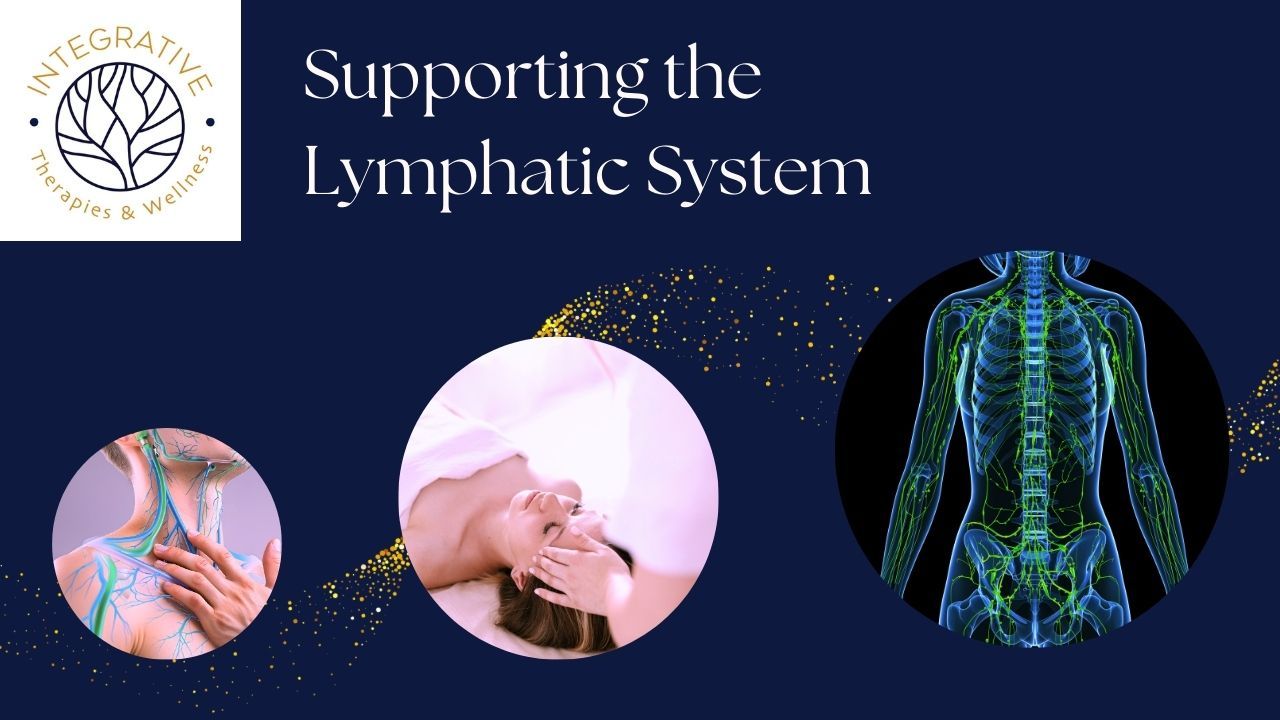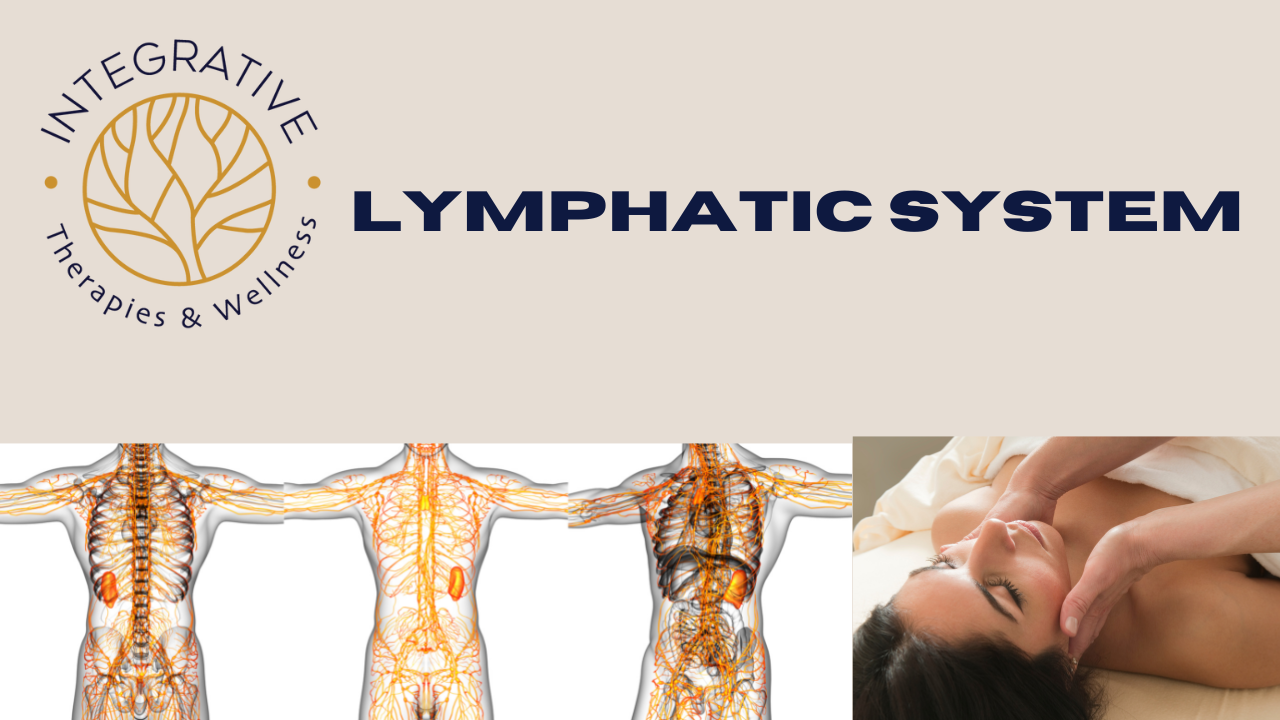Blog
Manual Lymphatic Drainage: A Natural Approach to Detox, Gut Health & Whole-Body Wellness

Supporting the Lymphatic System Naturally: A Whole-Body, Root-Cause Approach
At Integrative Therapies and Wellness our staff have found that many of the clients we serve are exhausted from chasing symptoms. They’ve tried the medications, supplements, and quick fixes—yet still don’t feel like themselves. Our approach to health and healing at Integrative Therapies and Wellness is different. We look at the whole person, listen to the body’s signals, and work with our clients to uncover why symptoms are happening, not just how to quiet them.
One system we consistently find overlooked in chronic illness, inflammation, and hormonal imbalance is the lymphatic system. When lymph flow becomes sluggish, the body has a harder time clearing waste, regulating inflammation, and supporting immune balance. Over time, this can contribute to pain, swelling, fatigue, brain fog, and a general feeling of being “stuck.”
To support this system gently and effectively, we often combine Manual Lymphatic Drai...
Natural Stress Reduction: Simple and Effective Techniques

Natural Stress Reduction: Simple and Effective Techniques
Stress is a natural part of life, but chronic stress can take a toll on our physical and mental well-being. Fortunately, there are natural ways to manage stress effectively without relying on medication. Here are some simple, evidenced-based techniques to help you find calm and balance in your daily life.
- Practice Deep Breathing
One of the easiest and most effective ways to reduce stress is through deep breathing exercises. Techniques such as diaphragmatic breathing and box breathing can help calm the nervous system and lower stress hormones.
- Engage in Regular Physical Activity
Exercise is a powerful stress reliever. Activities like walking, yoga, and swimming release endorphins, which help improve mood and reduce anxiety. Even a short daily walk in nature can have profound effects on stress levels.
- Prioritize Sleep
Lack of sleep can exacerbate stress and make it more difficult to cope with daily challenges...
The Vagus Nerve and Hormones

April is Stress Awareness Month
Did you know that the vagus nerve plays a key role in the regulation of hormones like cortisol (stress hormone), insulin, sex and thyroid hormones?
You may hear more and more women talking about symptoms they are experiencing, which are often linked to changes in their hormones. We are seeing and hearing it often, on social media, in conversations with clients as well as in small talk with friends and family.
Women experience hormone fluctuations every month during their menstrual cycle. Women also experience changes that affect their normal monthly pattern, with the aging process, as we enter perimenopause and menopause and due to disruptions in the endocrine system. These hormonal changes can come with undesired symptoms and side effects. Our level of stress and the function of our hypothalamus-pituitary-adrenal axis, can significantly affect the degree of symptoms we experience daily and during the transition to perimenopause and menopause....
Motion is Lotion: Move your body daily

What promotes good joint and bone health, mental fortitude, strength, excellent circulation, coordination, increased cognitive and learning capabilities, reflex reactivity, immune function and an ability to concentrate better? Movement.
It sounds so simple and yet, it eludes many people as they assume that movement equals exercise and exercise is strenuous and perhaps even unpleasant. But our bodies are designed to move, and movement is critical for physical and mental well-being; even small amounts of movement daily can offset various ailments and improve health.
Without movement, the body deteriorates and becomes susceptible to illness and disease. Regular movement is more important than ever, due to increasingly sedentary lifestyles. Movement provides various health benefits beyond weight loss, including improvement of cardiopulmonary, musculoskeletal and organ health. In short, sitting isn’t very good for us more than in short stints. It is estimated that an average Ame...
Endometriosis and the Integrative Approach

Endometriosis and the Integrative Approach
By Erin Lindberg / Mar 26, 2023
While there is no known cure for endometriosis, conventional medicine is yet to find a way to ‘treat’ endometriosis; mainly focusing on temporary symptom relief through surgery/hysterectomy, hormone therapies/birth control pills or prescription painkillers. Each comes with their own undesirable side effects and risks, while simultaneously failing to address the root cause of the problem.
Shared later, is a more integrative approach to managing endometriosis in lieu of succumbing to the pharmaceutical and surgical push, which includes a more holistic approach aiming to reduce inflammation, enhance immune function, alleviate pain, balance hormones and support natural detoxification through diet, lifestyle changes, supplements and therapies.
Endometriosis Facts
- Endometriosis is estimated to affect one in ten women of reproductive age (15-50), which is approximately 176 million women &...
Mind Body Connection

In the quest for healing, many people are learning the meaning behind the idea of mind-body connection. Much of what has been discovered stems from ancient methodologies, medicine, and healing practices that the western world is opening up to gradually. These ancient teachings have been lost in our fast-paced society that tends to clamor for the new, shiny thing, but the practices echo what we already know; the knowledge lives in our own intuition.
The philosophy behind mind-body connection is actually very simple and it means that these two seemingly separate things are actually the same; they are interconnected, and one influences the other’s health and fortitude. What we do with our mind affects our body and vice versa. Our mind is present throughout our body.
All of our thoughts can manifest internally and externally, meaning that our mind has a direct link and effect on our health, both mentally and physically. Does this mean if you have a negative thought, you will get canc...
Activate your lymphatic system for improved health

Feeling the need to detox? You may have searched all the different methods to rid the body of toxins, but did you know that your body has its own system to eliminate toxins?
What is the Lymphatic System?
Your lymphatic system acts as a disposal system that works throughout your body to help flush toxins out of the body and keep blood and fluid levels in balance. The lymphatic system is a subsystem of the circulatory system, composed of lymphatic vessels, nodes, ducts, organs and tissues, responsible for ridding the body of toxins by transporting lymph throughout your body so the toxins don’t accumulate and cause disease. Lymph is a clear fluid highly concentrated with white blood cells, responsible for helping your body fight infection and disease. When lymph doesn't move, our cells, tissues and organs can’t effectively remove waste products.
Unlike the blood system, the lymph system has no pumping mechanism and relies on the intrinsic contractions of the smooth muscle cel...
National Breastfeeding Month 2020

Integrative Therapies & Wellness is celebrating National Breastfeeding Month!
Breastfeeding comes with some incredible benefits!
Research shows that breastmilk can provide protection against certain common childhood illnesses, such as ear infections, respiratory infections, and diarrhea. It can also help to reduce the risk of certain allergies and type II diabetes. For mom, breastfeeding triggers the release of oxytocin, which plays a role in bonding with your baby, as well as stimulates the uterus to contract following childbirth. Breastfeeding may also reduce the risk of breast cancer as well as ovarian cancer.
protection against certain common childhood illnesses, such as ear infections, respiratory infections, and diarrhea. It can also help to reduce the risk of certain allergies and type II diabetes. For mom, breastfeeding triggers the release of oxytocin, which plays a role in bonding with your baby, as well as stimulates the uterus to contract following childbirth. Breastfeeding may also reduce the risk of breast cancer as well as ovarian cancer.
. . . As well as some challenges.
While the benefits of breastfeeding are numerous, breastfeeding can also come along with some challenges. Pain with latch, clogged ducts, mastitis, and low milk supply are all common but not normal when initiating a breastfeeding relationship. If you plan to breastfeed, it is helpful to have a plan in place if you should need addi...
Re-Balance with Grounding

Life is complex and hectic at times where we can get overwhelmed with excessive “thinking” leaving us “revved up” and lost in our “head space”. This state can leave us disconnected from ourselves and our surroundings. This is usually a sign that our nervous system is disrupted and if not addressed can lead to more complex issues.
Why do I need to practice grounding?
It is estimated that the mind thinks between 60,000 to 80,000 thoughts per day. Excessive thinking, especially negative or fear provoking thoughts, can trigger our sympathetic nervous system eliciting a stress response in our body. This stress response is also known as “fight or flight”, which can leave us in survival mode for an extended period of time.
If this becomes a habitual pattern, it can tax our adrenal glands, secreting too little or too much stress hormone, cortisol. Over time this can cause several stress related illnesses, such as ulcers, high blood pressure, cardiovascular diseases, chronic back an...
Boost Your Immunity

Thoughts of fear and worry elicit emotions, often unexpressed, which in turn creates a physiological response in the body. Research has proven that fear and related emotions can produce a chemical (TGF) that causes the fascia to thicken, increasing inflammation and compromising our immune system. Fascia is the soft tissue that weaves throughout our entire body surrounding and supporting every single cell and structure in your body. The thickening of the fascia becomes solidified, like a “straight jacket” on the body and becomes a source of pain, dysfunction, and limitation, which may cause additional fear, further thickening the fascia, creating more restrictions/contraction in an attempt to protect against the unidentified threat.
Authentic myofascial release stimulates a profound phenomenon. It begins with “pressure electricity”. It is understood that the fascia is a crystalline structure, and when pressure is applied to a crystal, you create electrical flow. After about 5 m...

